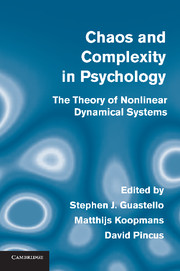Book contents
- Frontmatter
- Contents
- Contributors
- Preface
- 1 Introduction to Nonlinear Dynamics and Complexity
- 2 Collective Intelligence: Observations and Models
- 3 Neurodynamics and Electrocortical Activity
- 4 Psychophysics
- 5 Temporal and Spatial Patterns in Perceptual Behavior: Implications for Dynamical Structure
- 6 Embodied and Embedded: The Dynamics of Extracting Perceptual Visual Invariants
- 7 Origins of Order in Cognitive Activity
- 8 Nonlinear Complex Dynamical Systems in Developmental Psychology
- 9 Developmental Psychopathology: Maladaptive and Adaptive Attractors in Children's Close Relationships
- 10 Psychopathology
- 11 Coherence, Complexity, and Information Flow: Self-Organizing Processes in Psychotherapy
- 12 The Dynamics of Human Experience: Fundamentals of Dynamical Social Psychology
- 13 Group Dynamics: Adaptation, Coordination, and the Emergence of Leaders
- 14 Organizational Psychology
- 15 Complexity, Evolution, and Organizational Behavior
- 16 Agent-Based Modeling Within a Dynamic Network
- 17 Epilogue: Psychology at the Edge of Chaos
- Index
12 - The Dynamics of Human Experience: Fundamentals of Dynamical Social Psychology
Published online by Cambridge University Press: 18 December 2013
- Frontmatter
- Contents
- Contributors
- Preface
- 1 Introduction to Nonlinear Dynamics and Complexity
- 2 Collective Intelligence: Observations and Models
- 3 Neurodynamics and Electrocortical Activity
- 4 Psychophysics
- 5 Temporal and Spatial Patterns in Perceptual Behavior: Implications for Dynamical Structure
- 6 Embodied and Embedded: The Dynamics of Extracting Perceptual Visual Invariants
- 7 Origins of Order in Cognitive Activity
- 8 Nonlinear Complex Dynamical Systems in Developmental Psychology
- 9 Developmental Psychopathology: Maladaptive and Adaptive Attractors in Children's Close Relationships
- 10 Psychopathology
- 11 Coherence, Complexity, and Information Flow: Self-Organizing Processes in Psychotherapy
- 12 The Dynamics of Human Experience: Fundamentals of Dynamical Social Psychology
- 13 Group Dynamics: Adaptation, Coordination, and the Emergence of Leaders
- 14 Organizational Psychology
- 15 Complexity, Evolution, and Organizational Behavior
- 16 Agent-Based Modeling Within a Dynamic Network
- 17 Epilogue: Psychology at the Edge of Chaos
- Index
Summary
Introduction
There is an important but largely unrecognized paradox at the core of social psychology. On the one hand, everyone (psychologist and layperson alike) acknowledges the inherent dynamism characterizing human experience, from microprocesses of mind to macro processes of society. Social judgments are embedded in the rapid and ever-changing flow of thought, diverse emotions supplant one another on multiple time scales, social interactions revolve around the complex and time-dependent exchange of motoric and verbal acts, relationships evolve and undergo constant transformation on different dimensions, and collective phenomena at the level of groups and societies occur against the backdrop of a complex and constantly changing field of forces. The dynamism inherent in personal and interpersonal experience is reflected in the seminal contributions of such pioneers as James (1890), Mead (1934), Cooley (1902), Lewin (1936), and Asch (1946) and is apparent today in the coupling of the word “dynamic” with the various literatures that define the field. Thus psychologists theorize about personality dynamics, dynamics of attitude change, interpersonal dynamics, and group dynamics, as if these topics each represented a particular manifestation of an underlying proclivity for evolution and change on the part of people.
The very ubiquity of dynamism, however, renders it a poor candidate for generating theories in social psychology. Theories, after all, are couched in terms of invariant properties representing stable signals that are obscured by the noise associated with personal, interpersonal, and societal processes.
- Type
- Chapter
- Information
- Chaos and Complexity in PsychologyThe Theory of Nonlinear Dynamical Systems, pp. 370 - 401Publisher: Cambridge University PressPrint publication year: 2008
- 2
- Cited by



